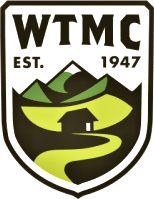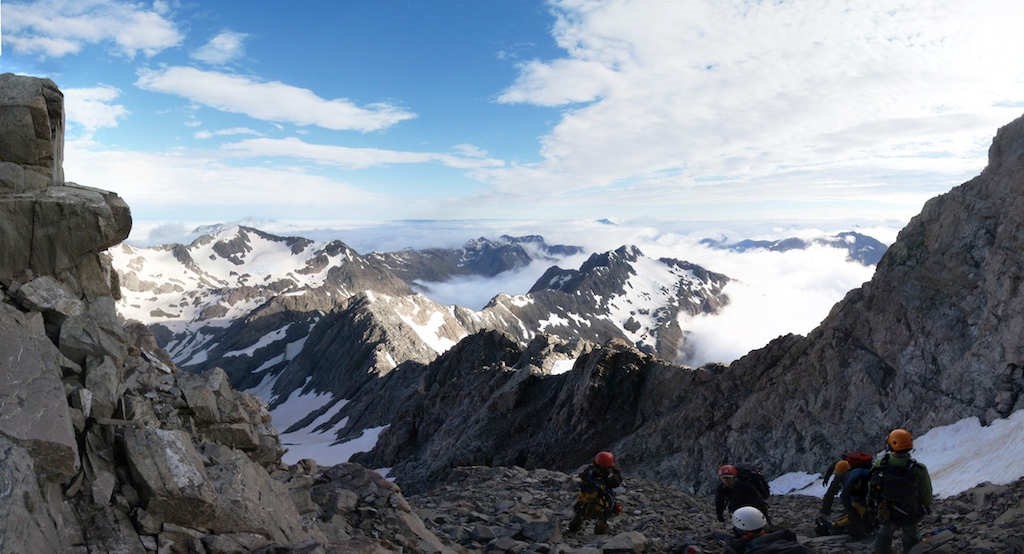I am lying on one of the top bunks of a small mountain hut in Arthur’s Pass national park. It is cramped. There are barely nine inches between my nose and the slope of the ceiling. It doesn’t matter, though, because I am too tired to sit up. I roll my head to the side and hear my spine popping. I can read the sign above the door of the hut without moving further: Waimakariri Falls Hut; Canterbury Mountaineering Club; 1963; 1260 metres. Somewhere outside is a view.
I stare at the ceiling. Two guys from Christchurch arrive at the door. With no tent and only one sleeping mat, mug and teabag between them, they are not particularly well equipped and seem disappointed to find the hut already full. Jenny had heard them crashing about in the bush the previous evening, further down the valley. Having moved on past Anti Crow hut, where we were staying, and then failed to find Carrington hut in the dark, they had spent the night in the open. Sharron makes them a brew and someone pitches a tent for them. I am still hurting too much to pay much attention. There is a bit of small talk, and they disappear outside.
My body aches and my joints are burning. We only walked for about six hours today, and for a couple of hours the night before, and the rest of the party is still full of beans. I am obviously out of condition. I groan quietly. On the bunk next to mine, Steve looks up from the book he is reading. “Pain is weakness leaving the body,” he tells me soberly. Clearly, I will be strong tomorrow.
* * *
Tomorrow began at around four o’clock, when David lit the stove and started boiling water for a brew. It was still very dark, a mild morning with a clear sky. The stars were visible above, but there was no moon. We ate breakfast and started sorting out our gear. I gave my rope to Steve, who had been so far ahead of me the day before that I had barely seen him. Outside the hut, I could hear Mark and Adrian arguing as they shared out the rock pro. “Give some to John,” someone suggested. I sat quietly, drinking my tea. Never be first, never be last, never volunteer. If they wanted me to carry some gear, they’d have to come and ask me. They didn’t. So far, things were going my way.
We started out just after five, walking steadily, first through scrub, then picking our way up through jumbled rocks and scree towards the snow. After a couple of hours or so, we reached the bottom of a long snow slope at the head of the valley, on the true left. This steepened gradually towards a rocky gully, which would lead eventually to the summit ridge of Mt Rolleston.
We stopped to put on crampons and have something to eat, then started upwards. The snow was good: firm but not icy, and easy to climb. First Jenny and then Ant led the way, kicking steps. Adrian brought up the rear. I stayed somewhere in the middle, keeping a low profile and a light pack.
“Rock!”
It was about ten o’clock. By now, we were well inside in the gully, waiting in a line below a more difficult section of rock. David had gone ahead and dropped down a rope. I stood close to Sharron, who was just about to follow him. We both looked up as he shouted. There was a sharp crack. Sharron turned to me. She looked dazed. Already, I could see blood welling up in the middle of her forehead. It began to run down her face. “Rather you than me,” I said encouragingly. “It looks bad.” And it did. We would have to retreat.
While Jenny bandaged Sharron’s head and David made his way back down to rejoin the group, the rest of us set up an abseil. The rock was cracked and loose and kept coming away in big lumps. We sent Steve down first to straighten out the ropes and test the anchors. The whole arrangement looked pretty dodgy. Once he was out of sight, we threw a couple of slings around another rock and tied them in as back up for the rest of us. Then, one by one, we followed.
By half past twelve, we were back at the hut. The guys from Christchurch were gone. Sharron seemed steady on her feet and uncomplaining. To my disappointment, there was no talk of helicopter rescue. Instead, it was agreed that we would spend the afternoon making our way back down the valley to Carrington hut, and walk out the following morning.
* * *
After breakfast the next day, we started to follow the Waimakariri riverbed out to the road end. It seemed a long way. Within half an hour, the group was strung out ahead of me in a long line. It was hot and hard on the feet. I could feel a blister coming up under my toe. I trudged along miserably with my head down.
The monotony was broken some time later, when Mark was attempting to ford the river. I looked up, saw him stumble, and he was over. Briefly, he recovered. Then the river caught him and he was down again. I could see him getting dragged along, struggling against the current.
Ant dropped his pack and sprinted forward to help. For a moment, I thought about doing the same. But I was tired and a long way behind. I didn’t know the guy that well anyway. This was an opportunity to catch up and eat some chocolate. I kept walking.
By the time I arrived, they had already fished him out. He looked alright to me. I dropped my pack and sat down. Ant walked slowly back to collect his gear.

